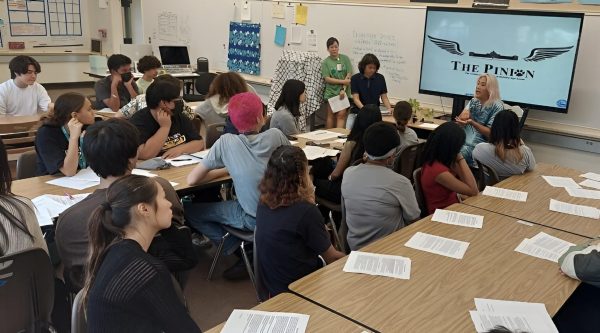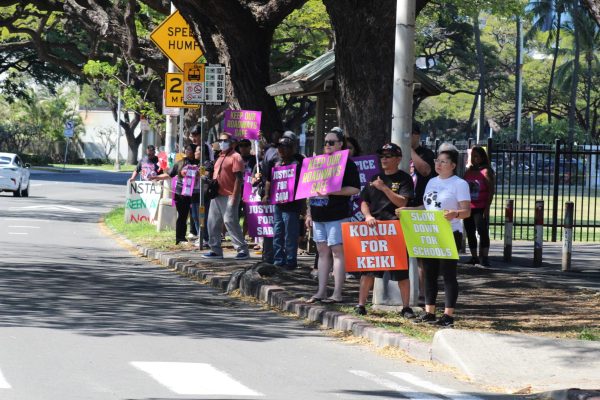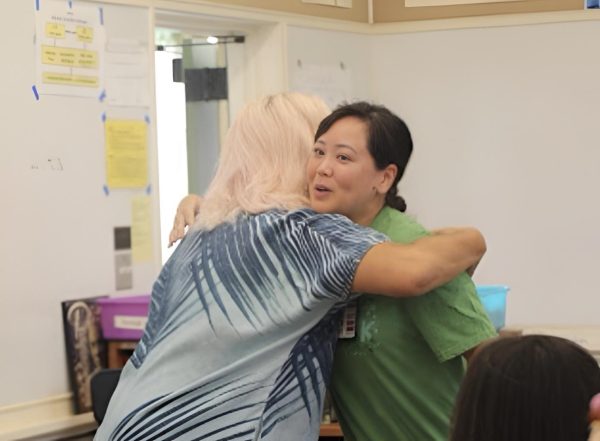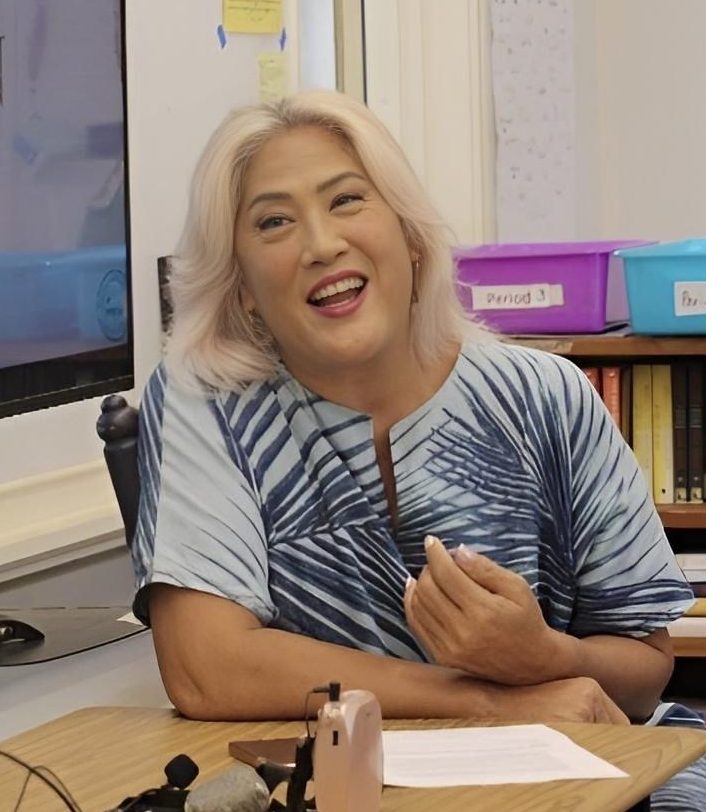In a widely contested primary election cycle, Hawaii’s race for the 25th State House District, covering Ala Moana, Kaka’ako, Downtown Honolulu, and McKinley High School, resulted in a historic upset.
Kim Coco Iwamoto unseated incumbent House Speaker Scott Saiki, who had been serving in the state legislature for three decades, in the Aug. 10 election. According to an analysis by Our Hawai’i, this marks the first time in U.S. history that a House speaker was defeated in a Democratic primary.
“[Scott Saiki] was endorsed by the governor, the lieutenant governor, our U.S. senator, our mayor, and the Honolulu prosecutor,” Iwamoto said to The Pinion. “I thank my campaign volunteers and small-dollar donors that made this win possible.”
Iwamoto, who had narrowly lost to Saiki by just 160 votes in both 2020 and 2022, secured a decisive victory this election with a five percent lead or about 250 votes. With no remaining competitors in the general election, she is set to become the first transgender woman elected to Hawaii’s legislature.
Following her victory, The Pinion hosted a town hall with Representative-elect Kim Coco Iwamoto at McKinley High School on Aug. 29. Moderated by Dominic Niyo, the event brought together Pinion journalists and students from Kyle Gaynor’s Participation in Democracy class to discuss Iwamoto’s campaign initiatives and legislative goals.
“[The interview] was a valuable experience for my students to engage directly with a [politician] and see their policy discussions in real time,” Gaynor said. “It took some time for them to understand the significance, but it later became an important teaching tool for grasping the broader context of democracy and civic engagement.”
Challenging the Establishment
Iwamoto, who ran as a progressive populist with a campaign fund of approximately $99,000, far less than Saiki’s $306,000—aims to challenge the Democratic establishment.
One of her initiatives in the legislature is to restore “representational democracy” and rebuild trust in the government. Through her campaign, she discovered that public confidence has declined over time. She emphasizes concerns about underrepresentation and the concentration of power in the state legislature, where committee chairs and the speaker hold significant influence.
“My goal is to distribute power more equitably among all representatives so that no single chair can unilaterally kill a bill,” Iwamoto said. “I want every representative to fully exercise the authority of their position on behalf of their people.”
She said her initial decision to run against Saiki in 2020, during the pandemic, was a response to his failure to address minimum wage increases. She claims the speaker prioritized meetings with lobbyists from the Chamber of Commerce, who advocated for the interests of large corporations.
“They opposed the increase,” Iwamoto said. “He did not meet with struggling families trying to pay rent or put food on the table—those actually facing the hardships of earning a minimum wage that’s effectively a poverty wage. He listened to the employers protecting their own profit margins.”

Addressing Hawaii’s Housing Shortage
A central focus of Iwamoto’s campaign is addressing Hawaii’s housing shortage. She argues that the disproportionate ownership of private property by out-of-state investors is contributing to the high number of vacant homes and escalating rents, creating a housing shortage, especially in central Honolulu, where many of her constituents live in condos.
Iwamoto has criticized what she describes as a tax-regressive system, where lower-income households pay a larger percentage of their income in state and local taxes compared to wealthier households.
“When the rich aren’t paying their fair share of taxes, it’s not like the cost and expense goes away,” she said.
To address this imbalance, Iwamoto advocates for reforms aimed at creating a more equitable tax system. One key proposal is implementing a surcharge on vacant homes to ensure out-of-state property owners contribute fairly. She argues that these investors often pay lower property taxes in Hawaii than in their home states, further exacerbating the housing crisis.
“If they choose to leave homes empty, they’re denying us the economic opportunity to collect tax revenue that would have been generated if a local family were living there,” she said. “We need to make sure that they’re paying their fair share.”
Yuuka Yamagishi (c/o 2025) a condo resident of Ala Moana and a student in the Participation in Democracy class who attended the town hall with Iwamoto, has experienced firsthand the fluctuations in condo rental prices. Yamagishi says Iwamoto’s appeal for change deeply resonated with her concerns about out-of-state investors leaving properties empty, leading to significant local revenue loss.
“My family has been living in the same unit for two years, and in that time, our rent has increased by $500,” Yamagishi said. “She is someone who can help us.”

Road Safety Initiatives
The death of student Sara Yara in a hit-and-run accident on Kapiʻolani Boulevard in Feb. 2023 has brought critical attention to pedestrian safety around the McKinley High School community.
Chevylyn Saniatan, Yara’s mother, endorsed Iwamoto’s campaign, emphasizing the importance of genuine leadership.
“How can we vote for [Saiki] who says he’s for the community … when he only shows up when there are cameras around?” Saniatan said in an advertisement produced by Iwamoto’s campaign. “Kim Coco, she doesn’t have to text me and see how I’m doing, but she does.”
The Pinion surveyed over 200 students and faculty, revealing that over 90 percent strongly supported increased pedestrian safety measures. Iwamoto has advocated for installing blinking lights to enhance pedestrian visibility and has urged the school community to unite in pressuring the legislature for action.
“When we give these huge tax cuts to the wealthy and turn around and say we have no more money for better crosswalks, it makes me angry,” Iwamoto said. “Students are being subjected to walking on dangerous streets. There should be more road safety investments.”
Principal Ron Okamura, a public supporter of Saiki’s reelection campaign, expressed hope that Iwamoto’s proposal to add blinking lights will improve safety for both drivers and pedestrians. He also highlighted the need for continued focus on Saiki’s road safety initiatives, such as the speed bumps added around the school.
“Anything helps,” Okamura said, “But we also need to address other issues, like [inadequate] street lighting and overgrown trees, to fully improve pedestrian safety.”

Serving the Community
Iwamoto, a licensed therapeutic foster parent and civil rights lawyer, has provided a home for several children, including LGBTQ+ youth facing legal and social challenges. Motivated by their experiences, she ran for the Hawaii Board of Education in 2006, making history as the highest-ranking openly transgender official in the nation at that time.
“We won that election decisively,’ she said. “I then focused on advocating for students to be free from bullying and harassment.”
“I continued to fight for the rights of marginalized communities, ensuring that our laws protect everyone equally,” she said. “His acknowledgment was an honor.”
Her influence extends beyond her legislative goals, making a significant impact on local classrooms through her support. Social Studies teacher Dwayne Sakaguchi, who received funding for essential school supplies through a DonorsChoose project, highlighted the transformative effect of her contribution.
“Iwamoto’s support in policy reform and education is shaping our future society,” Sakaguchi said. “She is an inspiration to the future leaders of Hawaii by providing the resources they need for a successful and fulfilled life post-high school.”
Iwamoto states that her victory over the speaker reflects a change desired by the community and highlights her focus on addressing systemic issues. She emphasizes her goal to advocate for legislative reform, aiming for representation that aligns with the needs and voices of the people.
“I think this is why this win is so important in sending a message to this power structure and all 51 representatives that the current state of the legislature is no longer acceptable,” she said. “Now is the time for change.”










